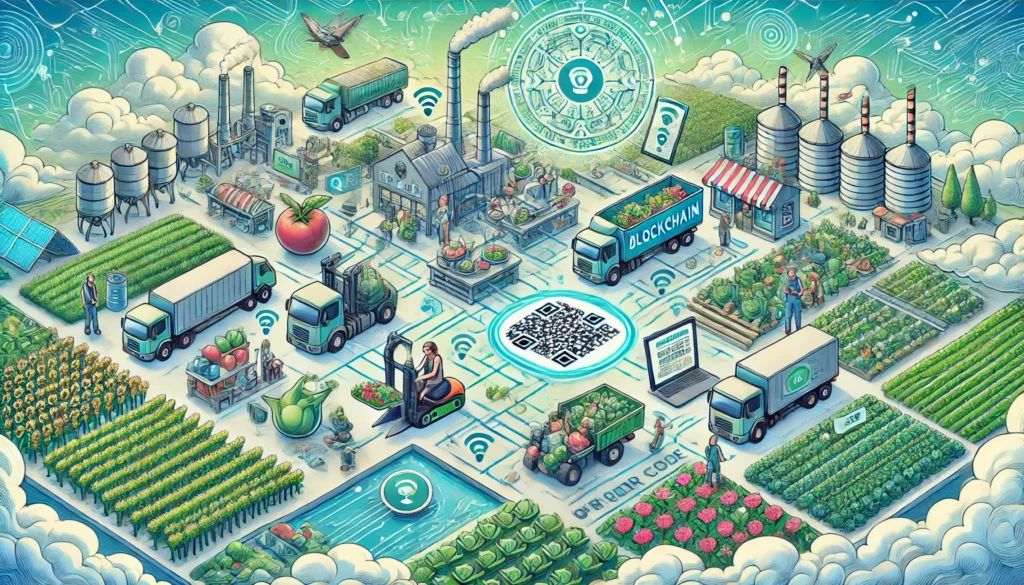Blockchain technology is transforming supply chains by providing unparalleled transparency and traceability, addressing long-standing challenges like fraud, inefficiency, and a lack of trust between stakeholders. In industries like agriculture and food, where ensuring product quality and safety is paramount, blockchain is enabling a “farm-to-fork” approach that empowers consumers and streamlines operations.
This article explores how blockchain is enhancing supply chain transparency, its applications in the food industry, and the challenges to its widespread adoption.
1. Challenges in Traditional Supply Chains
Traditional supply chains are often opaque and fragmented, involving multiple intermediaries and manual processes. This lack of transparency can lead to significant issues:
- Food Fraud: Counterfeit or mislabeled products enter the market, reducing trust and endangering consumer health.
- Traceability Gaps: It can be difficult to pinpoint the source of contamination or recall affected products quickly.
- Inefficiency: Paper-based records and siloed data systems result in delays and increased costs.
Blockchain addresses these issues by creating a shared, immutable ledger where every transaction or event is recorded, ensuring end-to-end visibility across the supply chain.
2. How Blockchain Enhances Transparency
1. Immutable Records
Blockchain provides a tamper-proof record of every transaction, from production and processing to distribution and retail. This ensures that all participants have access to accurate, verifiable data.
2. Real-Time Tracking
Using blockchain, supply chain stakeholders can update and access real-time data about a product’s journey. For example:
- Farmers can log harvest details.
- Distributors can record shipping milestones.
- Retailers can verify the product’s origin and quality.
3. Consumer Trust
Blockchain enables consumers to scan QR codes or labels on products to access detailed information about their origin, production methods, and supply chain journey. This transparency builds trust and supports informed purchasing decisions.
3. Applications of Blockchain in the Food Industry
1. Traceability
Blockchain allows food companies to track products from the source to the consumer. This is particularly important for:
- Fresh Produce: Ensuring fruits and vegetables are grown sustainably and transported under proper conditions.
- Seafood: Verifying that fish and shellfish are sourced legally and sustainably.
- Meat: Monitoring livestock conditions and ensuring humane treatment.
2. Food Safety
In the event of contamination or a recall, blockchain enables rapid identification of affected products, minimizing harm and reducing economic losses.
3. Certification and Sustainability
Blockchain can store certifications for organic, fair trade, or sustainably sourced products, ensuring they are authentic and traceable.
4. Reducing Waste
Blockchain helps identify inefficiencies in the supply chain, such as spoilage during transportation or delays, enabling companies to optimize operations and reduce waste.
4. Real-World Examples
IBM Food Trust
IBM’s blockchain-based platform connects farmers, processors, distributors, and retailers to provide end-to-end traceability. Major companies like Walmart and Nestlé use it to monitor their supply chains.
Provenance
Provenance is a blockchain solution that tracks the origin of food products, ensuring transparency for ethical and sustainable brands.
Carrefour
The European retail giant uses blockchain to trace fresh produce, meat, and seafood, allowing customers to scan QR codes for detailed product information.
Seafood Supply Chain
Blockchain initiatives like VeChain are helping combat illegal fishing by tracing seafood from catch to table, ensuring compliance with sustainability standards.
5. Benefits of Blockchain in Supply Chains
1. Enhanced Trust
By providing a transparent and tamper-proof record of transactions, blockchain fosters trust between producers, suppliers, retailers, and consumers.
2. Improved Efficiency
Automation through smart contracts reduces the need for intermediaries, streamlining processes and lowering costs.
3. Better Compliance
Blockchain ensures compliance with regulatory requirements by providing a clear audit trail.
4. Empowering Consumers
Consumers gain visibility into the origin and quality of their food, supporting ethical and sustainable choices.
6. Challenges to Adoption
While blockchain holds immense potential for supply chain transparency, challenges remain:
1. High Implementation Costs
Setting up blockchain systems requires significant investment in technology, training, and infrastructure.
2. Integration with Existing Systems
Many supply chains rely on legacy systems that are not compatible with blockchain, making integration complex.
3. Data Accuracy
Blockchain is only as reliable as the data entered into it. Ensuring accuracy at every stage of the supply chain is critical.
4. Scalability
Blockchain networks must handle vast amounts of data efficiently to support global supply chains.
5. Regulatory Uncertainty
Regulations regarding blockchain and data sharing vary across regions, complicating adoption for multinational companies.
7. The Future of Blockchain in Supply Chains
As blockchain technology matures, its adoption in supply chains is expected to grow. Key trends shaping the future include:
- Integration with IoT: Sensors and IoT devices will automate data collection, ensuring accurate and real-time updates on blockchain networks.
- Smart Contracts: Automated processes like payments and compliance checks will streamline supply chain operations.
- Global Standards: Collaboration between governments and industries will lead to standardized blockchain protocols, facilitating global adoption.
Conclusion
Blockchain is revolutionizing supply chains by providing transparency, traceability, and efficiency. In the food industry, where trust and safety are paramount, blockchain’s ability to track products from farm to fork is transforming how goods are produced, distributed, and consumed.
While challenges like cost and scalability remain, the benefits of blockchain far outweigh the hurdles. As technology evolves and adoption increases, blockchain will play a central role in building trust and sustainability in supply chains worldwide.


